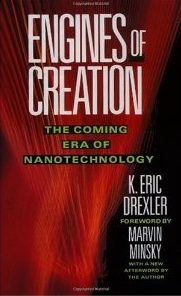by K. Eric Drexler
Synopsis By Dan Geddes
Engines of Creation introduces the power and possibilities of nanotechnology to the general reader. Drexler believes that nanotechnology—the ability to create molecular assemblers capable of constructing nearly anything in limitless quantity—will become viable sometime in the 21st century. Nanotechnology will have dramatic effects on medical technology (including reversing the aging process), the space program, and military technology. Drexler believes that if used wisely nanotechnology can bring about much higher living standards for everyone, and little impact on the environment. Drexler also discusses the great dangers of nanotechnology, and hopes that the “leading force” in nanotechnology will introduce it into the world in such a way that it will not fall into the hands of a totalitarian power. (Drexler believes that molecular assemblers are more dangerous even than nuclear weapons). On balance, Drexler sounds a hopeful note. He outlines various procedures and institutions that could be used to help soften the shock of assembler’s unveiling to the world.
Drexler divides his book into three parts. Part One, The Foundations of Foresight, explains the current state of nanotechnology, and so serves as a basis of his later predictions.
Part Two, Profiles of the Possible, offers predictions of various uses of assemblers, including: industrial technology to create anything (including food) in abundance (perhaps making much of the workforce redundant); artificial technology, to create computers that are more intelligent than human beings in every sense of the word; space exploration, to create spacecraft capable of indefinite stays in space, and harnessing the vast material resources of space, and creating true space colonies; and medical technology, to create assemblers capable of sailing through our capillaries to heal diseased organs, or even to replace all our old cells, and allow us to live healthy lives for hundreds of years. Drexler counters some of his dramatic claims by pointing out that even for assemblers physical limits will still obtain; that not anything is possible.
Part Three, Dangers and Hopes, presents the many dangers of nanotechnology. Assemblers could be used by a repressive regime to oppressive its citizens. Or could used by an expansionist power to bully other powers. Or technical mistakes could allow assemblers to behave in unpredictable and destructive ways. Drexler hopes that leading scientific institutions will adopt procedures such as scientific due process and hyper text documents (an accurate forecast of the worldwide web) so that many minds are brought to bear on the scientific and institutional problems that the impending arrival of nanotechnology will bring.
As much as anything else, Engines of Creation is a work of future studies, so it is difficult to assess its validity. Drexler spends as much or more time on scientific methods and procedures, explaining why his forecasting rests on a solid foundation, as he spends describing nanotechnology itself.
If Drexler proves right on the feasibility and applications of nanotechnology, then the age of assemblers would mark perhaps the greatest of all scientific breakthroughs, but yet perhaps the most destructive of man. More than merely the material benefits assemblers could bring, they could make much of the human race “obsolete” from a production perspective, thereby inaugurating a time of undue stress on the social order. Assemblers would prove to be an exceptionally difficult technology to control, and one fears that the techology would eventually fall into the wrong hands.
But in assessing the future it is important to keep in mind that history is incremental, that one day follows the next, and that checks and balances do exist; that new equilibriums are often achieved.
8 August 1999






Be First to Comment